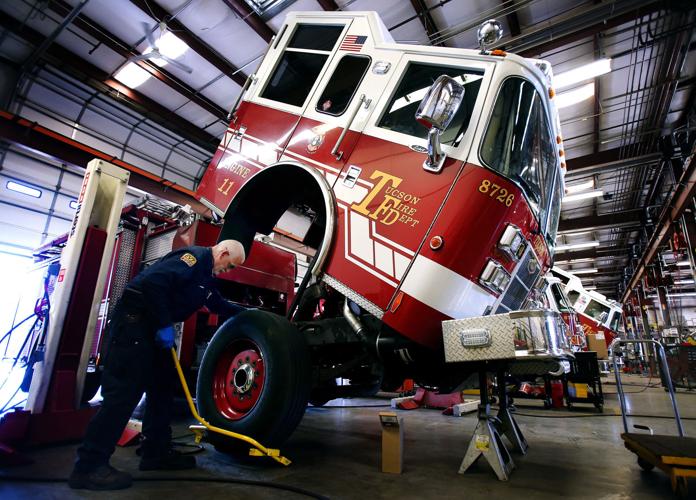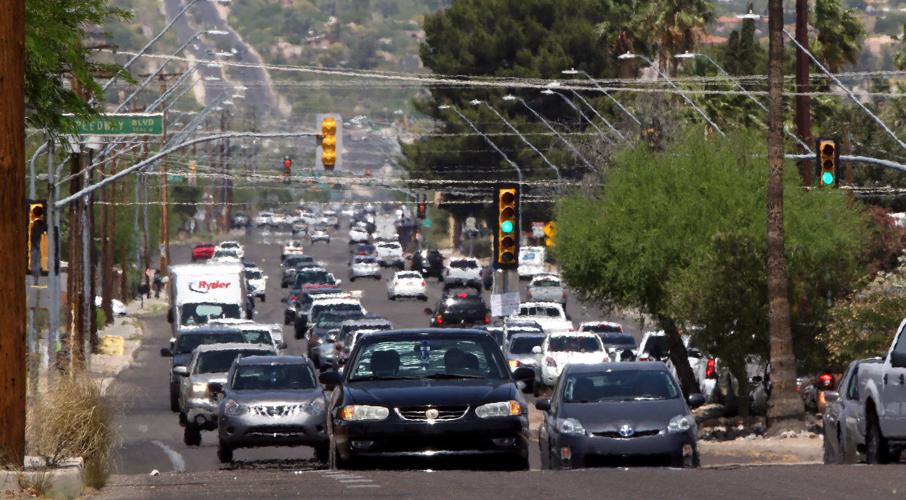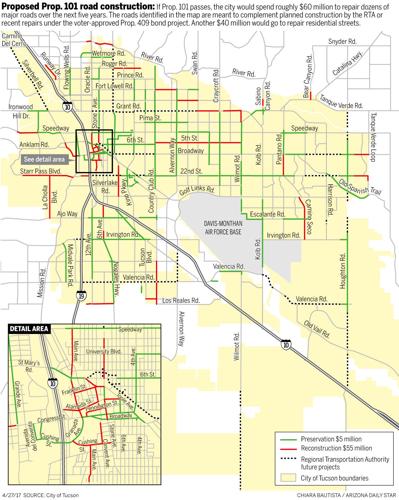Tucson leaders say the city’s public safety departments and roads are in serious need of upgrades and repairs, and officials are hoping residents will vote next month to open their wallets a bit to help pay for $250 million in improvements.
Public safety officials point to aging facilities and vehicles, some that need expensive repairs, and equipment that is past its prime. They point to the need for better technology to solve crimes, fight fires and protect lives.
It is unlikely you will see a firetruck broken down on the side of the road or a police patrol car being towed, but city officials say it is happening, and without a massive influx of money, it will continue to happen.
City leaders are counting on voters to back Proposition 101 in a vote-by-mail election May 16, which would increase the city’s sales tax by a half-cent — from 2 cents per $1 to 2½ cents — for the next five years.
Mayor Jonathan Roths-child says the measure is the only option the city has to invest in public safety and fix city streets. He said if the measure fails, vital city services will suffer.
“It is pretty simple: It would be a $100 million loss for streets and a continued struggle for our police and fire departments to deliver services in a safe and timely manner,” said Rothschild.
In what adds up to 5 cents more on a $10 pizza, city officials estimate Prop. 101 will cost the average Tucson resident about $3 extra a month. If backed by voters, an estimated $250 million enterprise fund would be created from the revenue to fix city streets — large and small — and improve public safety equipment.
The City Council would set aside $100 million for road repairs, with about $60 million used for major roads, and the rest for residential streets. The fire and police departments would receive $150 million, about $75 million each, for equipment upgrades and capitol improvements.
If Prop. 101 is approved, the Fire Department would receive $31 million for pumper and ladder firetrucks, paramedic units, special-purpose vehicles and another $3.2 million to replace nonspecialized vehicles in its fleet. Another $6 million would go to replace outdated equipment, including fire turnout gear, paramedic cardiac monitors and specialized laptops used for medical emergencies.
Nearly $27 million would be used to rebuild five outdated fire stations and another $5.8 million would go to renovate another nine stations.
The Police Department would receive $21 million to replace mostly patrol vehicles, although the city has plans to replace motorcycles, unmarked vehicles and some specialized vehicles. Another $600,000 would be set aside to upgrade the city’s aging helicopter fleet. It would get $38 million to upgrade facilities, including building a new south-side substation and southeast-side annex.
About $8.4 million would go to replace equipment, including rugged laptops, cameras mounted inside patrol cars and body cameras for officers, as well as ballistic vests.
Aging trucks, stations
Deep inside a city garage, Assistant Fire Chief Joe Gulotta is surrounded by fire engines, ladder trucks and ambulances being repaired. Eight vehicles are inside the garage, with several more waiting to be serviced outside. Technicians on this day are checking a massive pump used to push water through hoses.
There are a handful of mothballed fire vehicles behind the garage, but they have been stripped of parts as mechanics looked to keep costs down .
Tapping a turn-signal light on the back of a firetruck, Gulotta said hard-to-find parts fetch a premium online — easily hundreds of dollars for a small item. They simply don’t make them anymore, he said.
A new ladder truck can cost about $1.6 million.
“Our concern is that when vehicles get old they become unreliable,” he said, noting it takes between six to eight minutes for the department to respond to a 911 call.
Inside an adjacent warehouse, he pulls out boxes filled with yellow flame-resistant suits that have frayed, torn or been damaged. A new set of turnout gear — designed to protect a firefighter — costs more than $2,700, he said. The plan would use about $1.2 million to purchase new turnout gear.
For Gulotta, Prop. 101 can help his department better respond to emergencies, saying every minute saved getting to a patient is vital. In terms of a heart attack, a person can suffer permanent brain damage if blood stops pumping for more than four minutes. “Every minute after is a 10 percent reduction in survival,” he said.
Patrol cars and bulletproof vests
Assistant Police Chief Carla Johnson also talks about how a delay — even a few minutes — poses a genuine threat to public safety.
With $21 million set aside to buy patrol vehicles, Johnson remembers when an officer under her supervision couldn’t get to a critical incident because the officer’s patrol vehicle broke down.
“We’ve kicked the can down the road so far,” she said about delaying purchases. “Many of the (vehicles) are now facing catastrophic failure.”
The Police Department estimates 63 percent of its patrol vehicles are beyond their recommended useful service life and 81 percent of the unmarked vehicles are due for replacement.
Jason Winsky, with the Tucson Police Officer’s Association, said he has seen patrol cars break down during a call. “Ideally we have enough officers that we can reroute that call,” Winsky said. “When you talk about the difference between one minute, three minutes and seven minutes, we are really talking about a big difference.”
Another important issue for the department, says Johnson, are ballistic vests.
Currently, the city issues a ballistic vest to new officers, but requires officers to replace their vests when they expire. The Tucson Police Foundation uses donations to help officers buy a new $725 vest when the vests’ warranties expire.
Johnson concedes there are officers wearing vests beyond their lifespan. “It is a public safety issue; we should be providing the vests,” she said. The city has set aside $760,000 in Prop. 101 funds to buy the vests.
The police officers union, in its letter of support for the proposition, said the funding is a matter of officer safety, noting how Officer Jorge Tequida survived being shot last December thanks to his vest.
Prop. 409 was
the first step
With hundreds of millions of dollars in identified road projects, city officials concede there is much work still left to do when it comes to streets. It remains the top request from the public, whether it be about fixing congested streets or filling potholes.
By the time voters backed the $100 million Prop. 409 in 2012, Tucson roads had deteriorated as the Legislature took millions of dollars in Highway User Revenue Funds from city coffers to balance the state budget.
Today, the city program to fix streets using $100 million in general obligation bonds is well ahead of schedule and under budget, says city Transportation Director Daryl Cole. The city says it has improved nearly 180 miles of streets through this program, which ends in 2018.
Part of that success is tied to the price of oil — as it is roughly half of what the city had predicted five years ago when it identified streets to fix under Prop. 409. The city was able to fund the equivalent of $30 million in additional road projects.
Prop. 101 will make some changes to how it spends money on fixing streets, mostly putting more funds into neighborhood streets. With Prop. 409, 15 percent of the $100 million was set aside for smaller streets, but under Prop. 101, it will be 40 percent of the $100 million.
Additionally, $5 million will be spent on preservation treatments to extend the life of newer roads.
Project oversight
As of now, there is no organized group opposed to Prop 101. The Tucson Association of Realtors, Tucson Medical Center, Tucson Metro Chamber, Tucson Police Officers Association and the Tucson Fire Fighters Association have endorsed the proposal.
However, David Eppihimer, chairman of the Pima County Republican Party, said if the Democrat-controlled City Council has to ask voters for help to provide core services, they need to be voted out of office.
Rothschild, a Democrat, rejects Eppihimer’s criticism, labeling it as a thinly veiled partisan attack. He notes that Prop. 101 has been endorsed by the Chamber of Commerce, which is hardly a Democratic institution.
“Anyone who wants better roads and economic development will vote for it,” Rothschild said. “This is really necessary for our community,” the mayor said.







